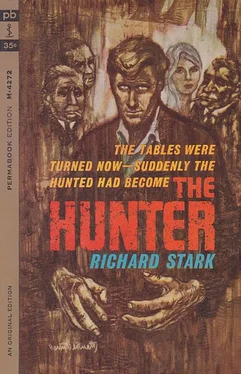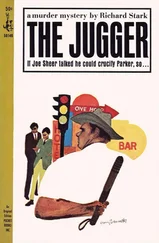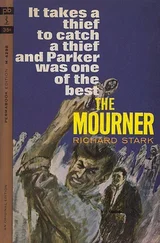The silent man stood watching him, not knowing what to do. When Parker didn’t look up, he shrugged and went out and closed the door again. Parker put the magazine down and got to his feet. He studied the two fox-hunting prints on the wall, but neither were one-way mirrors. He looked at the unmarked door. The knob was a golden brass, with the keyhole set in it. It looked like a tough lock. Parker thought of three men he knew who could go through it like a knife through butter.
Five minutes went by, and the silent man came back, looking mistrustful. He said, “Mr. Carter will see you. I’ve got to frisk you first.”
Parker raised his arms at his sides. Mal was dead now, and the mean urgency was out of him. He was reasonable now, a businessman coming to discuss a debt. The silent man could frisk him — it didn’t matter.
The silent man finished and stepped back. “You’re clean,” he said grudgingly. He unlocked the door and led the way through. They went through the gray office and the living room — bar into Mr. Carter’s office. Mr. Carter sat at his desk, reading a mimeo-graphed stock report. He looked up and said, “I didn’t know Mal was dead.”
“He is.”
“Oh, I don’t doubt your word.” He motioned at the leather chair Mal had sat in. “Sit down there.”
The silent man was behind Parker. He turned away, heading for his chair in the corner, and Parker spun around, left hand extended, fingers rigid. The tips of his fingers jolted into the silent man’s side, just above the belt. The silent man grunted and bent sideways, trying to breathe. Parker’s right hand came across, balled in a fist, and clipped the side of his jaw, just under the ear. The silent man started to fall, and before he hit the floor Parker had the.32 out of his hip holster. He turned back and Mr. Carter was still reaching into his drawer. He stopped when he saw the.32 pointed at him.
Parker said, “Close the drawer.”
Mr. Carter looked at his man on the floor and closed the drawer. Parker broke the.32 open and emptied the shells into his hand. The noses had been scored, to make them spread when they hit. He walked over to the desk and put the.32 on the green blotter. The shells rattled into the wastebasket.
“You don’t want me with a gun. I don’t want you with a gun either.”
Mr. Carter looked at his man again. “He’s one of the best.”
Parker shook his head. “No, he isn’t. He lulls too easy.” He sat down in the leather chair. “We can talk now.”
Mr. Carter smiled thinly. “I think Resnick lied to me.”
“Why? What did he say?”
“He said he shot you, took your proceeds from a payroll robbery, and ran off with your wife.”
“One part’s a lie. My wife was the one who shot me.”
“Oh? That way I can see it.” Mr. Carter spread his hands palm down on the blotter, to either side of the empty gun. “There’s something you want from me?”
“Mal gave you people eighty thousand dollars.”
“ Paid us. It was a debt.”
“Forty-five thousand of it was mine. I want it back.”
Mr. Carter’s faint smile disappeared. He blinked, looked again at his man on the floor and said, “You can’t be serious.”
“It’s my money.”
“The organization was owed a certain sum,” Mr. Carter said. “The organization was paid. Any debt Resnick owed you has died with him, so far as the organization is concerned. We don’t undertake to settle our employees’ personal debts.”
Parker said, “You people have forty-five thousand dollars of my money. You’ll give it to me.”
Mr. Carter shook his head. “The request would never be approved. The organization would certainly decline to—”
Parker interrupted. “The funnies call it the syndicate. The goons and hustlers call it the Outfit. You call it the organization. I hope you people have fun with your words. But I don’t care if you call yourselves the Red Cross, you owe me forty-five thousand dollars and you’ll pay me back whether you like it or not.”
Mr. Carter’s cold smile came back to his lips. “Do you realize, my friend, just what you’re trying to fight? Do you have any idea just how many employees are on our organization payroll, coast to coast? Just how many affiliate organizations in how many towns? How many officials we control at local and state level all across the country?”
Parker shrugged. “You’re as big as the Post Office. So you’ve got the assets, you can pay me back my money with no trouble at all.”
Mr. Carter shook his head. “I’m trying to tell you for your own good,” he said, “uh — I’ve forgotten your name. Resnick told me but I’m sorry, it slipped my mind.”
“Parker. It won’t again.”
The smile strengthened for just a second. “No, I don’t suppose it will. All right, Parker, allow me to give you the facts of life. The organization is not unreasonable. It pays its debts, works within acceptable business ethics, and does its best to run at a profit. Except for the fact that it works outside the law, it conforms as closely as possible to the corporate concept. In other words, if you had come to me with a legitimate corporate debt, you would have no trouble. But you are asking us to reimburse you for a personal debt contracted by a former employee. No corporation in the world would agree to that, Parker, and I’m sure our organization wouldn’t either.”
“Mal gave you money that didn’t belong to him. It belonged to me. You know that now, so you can give it back.”
“In the first place,” said Mr. Carter, “I personally couldn’t give it back. That would have to be the result of a top-level decision. In the second place, I can’t tell you right now that I’m so certain what that decision would be that I’m not even going to pass the request on.”
“It’s not a request,” Parker said. Without waiting for a comment on that, he went on. “What’s your job in this organization, anyway — this corporation of yours? What are you, a vice president or something?”
“You might call me a regional manager. With another gentleman—”
“Fairfax.”
Mr. Carter nodded, smiling. “Resnick told you quite a bit before he died, didn’t he? Yes, Mr. Fairfax. He and I manage the New York interests of the organization.”
“All right, then who runs the whole thing? You said you knew what the decision would be. Who’d make the decision?”
“A committee would—”
“One man, Carter. You go up high enough, you always come to one man.”
“Not exactly. Not in this case. Three men. Any one of them, actually—”
“Are any of them in New York?”
“One. But if you’re asking me to call—”
“I’m not asking you to call.” Parker heard movement behind him. He got to his feet. The silent man was coming back to consciousness, doing a push-up off the floor, getting his knees beneath him. Parker heel-kicked him in the head, and he subsided. He turned back to Mr. Carter. “I’m not asking you to call,” he repeated. “I’m telling you to call.”
“What will you do if I refuse?”
“Kill you, and wait for Fairfax to come back to town.”
Mr. Carter made a tent of his fingers and studied it. His lips pursed and relaxed, pursed and relaxed. He looked up from under his brows at Parker and said, “I believe you. And if I call, and this gentleman refuses, as I know he will?”
“I don’t know,” Parker told him. “Let’s see what he has to say.”
Mr. Carter thought about it some more. Finally he said, “Very well. You’re not going to get anywhere, but I’ll call.” He reached for the phone and dialed. Parker watched, remembering the number. Mr. Carter waited a moment, then said, “Fred Carter to talk to your boss, sweetheart.” He paused, then frowned with annoyance and said, “Tell him Fred Carter.” Another pause and, with more irritation, he said, “Bronson. I want to talk to Bronson.”
Читать дальше












